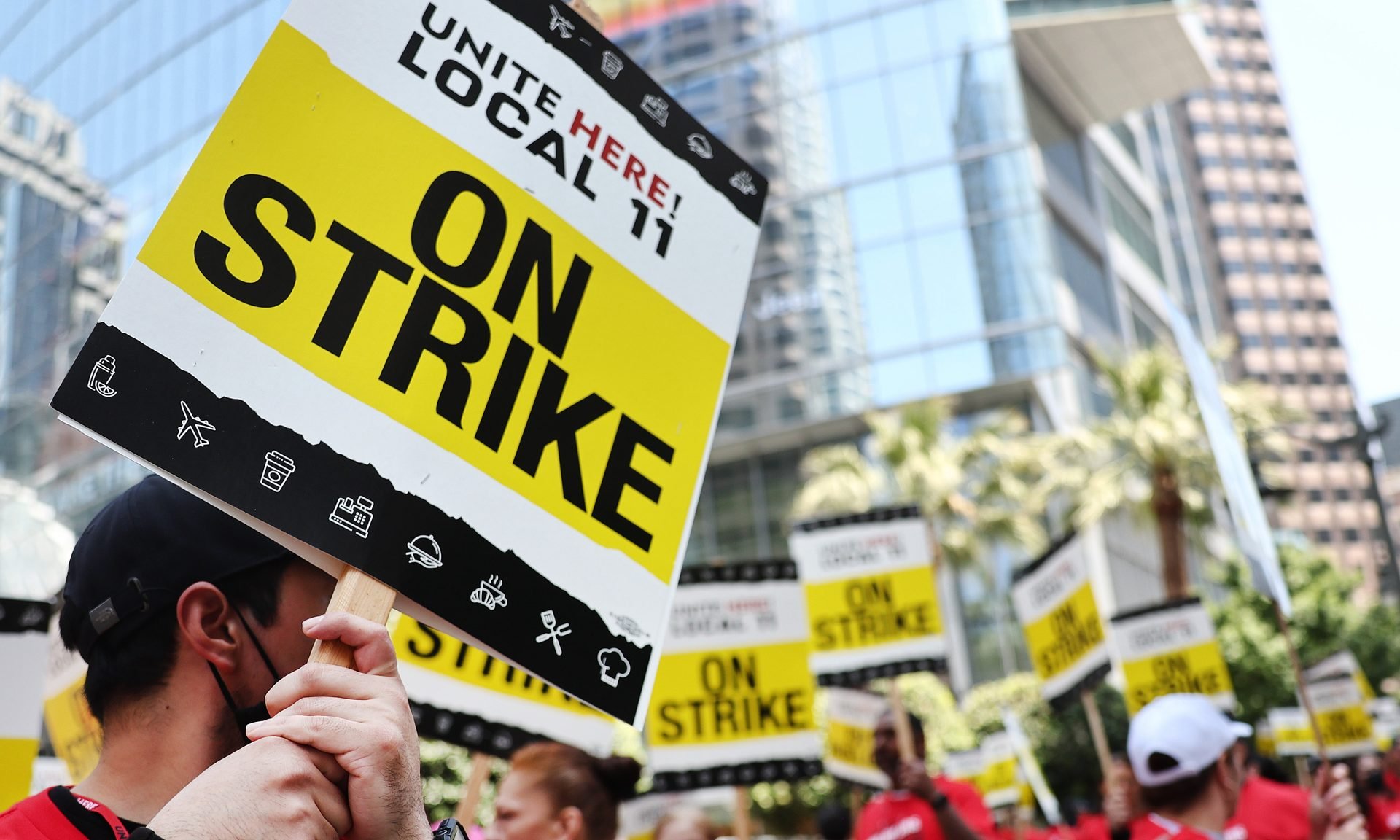Who’s On Strike in the U.S.?
There have been 199 labor actions so far in 2025.

Many, or all, of the products featured on this page are from our advertising partners who compensate us when you take certain actions on our website or click to take an action on their website. However, this does not influence our evaluations. Our opinions are our own. Here is a list of our partners and here's how we make money.
Updated on Oct. 1.
Hilton-Americas Houston workers. On Sept. 1, workers at HIlton Americas-Houston went on strike, demanding a $23 per hour minimum wage. The workers’ contract ended on June 30. The strike was extended twice and is slated to end on Oct. 12.
Construction workers in eastern Washington. On Aug. 12, some 300 members of the International Union Operating Engineers Local 302 in eastern Washington went on strike. The construction workers are negotiating with the Associated General Contractors.
Boeing jet and weapons workers. On Aug. 4, about 3,200 machinists at Boeing plants in Missouri and Illinois walked off the job. The strike began after the International Association of Machinists and Aerospace (IAM), the union representing the workers, rejected a four-year contract with Boeing.
Port workers in Illinois. Port workers are striking against QSL America, a logistics operator, at three of its sites in Illinois. The workers are represented by the International Union of Operating Engineers Local 150, which includes more than 24,000 members in Indiana, Illinois and Iowa. They are demanding safer working conditions, overtime pay, and additional protections for workers. The union alleges that QSL America has fostered a hostile work environment — including surveillance — and has wrongfully terminated employees who protested against the company’s labor practices.
So far in 2025, there have been 199 official labor actions, according to the Cornell University School of Industrial and Labor Relations (ILR) Labor Action Tracker. In 2024, there were 345 labor actions in 519 locations, according to the tracker.
Going on strike means workers withhold labor from their employer in order to gain leverage to bargain for things like higher compensation and benefits, more protections, as well as improved working conditions. Workers don’t have to be part of a union to strike, but unions often organize and authorize strikes, as well as represent workers in negotiations.
» MORE: What is a strike?
Meet MoneyNerd, your weekly news decoder
So much news. So little time. NerdWallet's new weekly newsletter makes sense of the headlines that affect your wallet.
More strikes are expected in the days to come. Here are some of the recent major strikes in the U.S.
Philadelphia city workers
On July 8, Philadelphia city workers ended a weeklong strike that affected trash pickup services. On July 1, some 10,000 workers — represented by District Council 33 of the American Federation of State, County and Municipal Employees — walked off the job. During the week, trash wasn’t collected throughout the city. The workers’ new contract includes increased pay and annual raises.
Western Washington University student workers
On June 6, a strike by some 1,200 student workers at Western Washington University in Bellingham, Wash. ended. The strike began on May 28. The union won layoff protections, expanded leave, mental health support and wage adjustments. However, the workers did not receive union recognition by the university. The group voted to unionize in December 2023 as Western Academic Workers United.
UAW workers at Lockheed Martin plants
On June 2, members of the United Auto Workers union (UAW) at Lockheed Martin assembly plants in Denver and Orlando, Fla. won a contract and ended a nearly monthlong strike. UAW Local 788 in Orlando and Local 766 in Denver workers went on strike on May 5, members of the United Auto Workers union (UAW) at Lockheed Martin assembly plants in Denver and Orlando, Fla. went on strike. The workers won 20% pay raises over five years, higher starting pay and shortens the amount of time workers need to be employed to get their full pay rate.
Jet engine machinists at Pratt & Whitney
On May 28, machinists at Connecticut-based jet engine maker Pratt & Whitney ended a three-week strike after approving a new contract that includes wage increases and job security measures. On May 25, some 3,000 members of the International Association of Machinists and Aerospace Workers walked off the job.
Kaiser Permanente mental health workers
On May 8, after more than six months on strike, more than 2,300 behavioral health professionals in Southern California reached a tentative agreement with Kaiser Permanente. Members of the National Union of Healthcare Workers were seeking wage increases and a restoration of pensions, and were calling attention to deficiencies in Kaiser’s mental health care because of staffing shortages and related issues. The strike began on Oct. 21 and became the largest mental health worker strike in U.S. history.
NJ Transit and train engineers
On May 18, after a three-day strike, engineers reached a tentative agreement with NJ Transit, the state’s public transportation company. The Brotherhood of Locomotive Engineers and Trainmen, which represents some 420 NJ Transit train engineers, were bargaining for wage increases. NJ Transit serves nearly 200,000 commuters daily.
University of Oregon student workers
On May 8, UO Student Worker Union reached a tentative deal with the University of Oregon that ended a nine-day strike. The deal increases wages, shortens pay periods and provides student workers with protections against harassment. On March 30, United Academics, which represents some 1,700 faculty at University of Oregon, reached a tentative agreement with the university and avoided a strike.
Caesars Southern Indiana Hotel and Casino
On April 26, a 13-day strike by workers at Caesars Southern Indiana Hotel and Casino ended. Over 140 workers, led by Teamsters Local 89, went on strike on April 14. The casino is owned and operated by the Eastern Band of Cherokee Indians in Elizabeth, Ind. The new five-year contract includes higher wages, improved benefits and stronger protections for the workers.
Non-tenured faculty at Wellesley College
On April 25, contract negotiations restarted between non-tenured faculty and Wellesley College, ending a monthlong strike. Wellesley Organized Academics, which represents the workers, is bargaining for increased compensation, added benefits and workload changes. On March 28, non-tenured faculty at Wellesley College walked off the job after 10 months of failed negotiations with the college.
Manhattan Beer
On April 15, some 600 delivery drivers with Workers United at Manhattan Beer in Bronx, New York began a strike that lasted for two days. The union struck a deal with the beer distributor, which includes protections for workers’ pensions.
Corrections officers across New York prisons
On March 8, after a 22-day wildcat strike, corrections officers reached a deal with New York state. It was the fourth deal the state offered. In the process more than 2,000 officers who did not return to work on March 10 were fired.
The strikes began at two upstate prisons on Feb. 17 and quickly spread to 38 out of the state’s 42 facilities. Workers are reportedly demanding better pay, increased staffing, increased searches of prison visitors and a reversal of recent reforms limiting solitary confinement. Hochul responded aggressively, deploying some 3,500 members of the National Guard to stand in for striking officers. The state also began taking away health insurance of COs who did not returned to their posts and pursued fines, as well as legal action.
The strike was not authorized by the New York State Correctional Officers and Police Benevolent Association (NYSCOPBA). <br>There were multiple brief inmate uprisings at New York state prisons prior to and during the strikes. And there are still three separate investigations into incidents that left inmates dead.
Stagehands in New York City
On March 10, striking workers at the Off Broadway Atlantic Theater Company reached a tentative deal that would enable theater productions to resume. The workers began the strike on Jan. 12 after contract negotiations broke down. The workers, which unionized last year, are represented by the International Alliance of Theatrical Stage Employees (IATSE). Two productions closed due to the strike.
Oregon Providence health care workers
On Feb. 25, , the union representing Providence health care workers agreed on a deal with the hospital network. The new agreement ended the largest health care strike in Oregon’s history — a 46 day ordeal. On Dec. 10, the Oregon Nurses Association went on strike. Among the 4,800 nurses working at eight Providence hospitals and six clinics, all but 600 walked off the job. Dozens of physicians also joined the protest.
Workers at a bird flu lab in California
Workers at a California lab — the only one with the authority to handle and confirm high-risk cases of avian flu — went on a three-day strike on Feb. 26. The workers, represented by The University Professional and Technical Employees-CWA Local 9119 union, have cited chronic staff shortages as the key reason for the strike.
Teamsters at Costco
A tentative deal to prevent a strike was reached between Costco and some 18,000 union members at warehouse stores across five states. The Costco locations are in California, New York, Maryland, Virginia and Washington. The union negotiated for better pay and benefits, along with improved working conditions. A day prior to the Feb. 1 strike deadline, Costco announced it was increasing pay for workers beginning in March — rising $1 to $30.20 per hour for store clerks and assistants and a 50 cent increase for entry-level workers, which brings their pay to $20 per hour.
University of Michigan health care workers
On Jan. 14, University of Michigan Health-Sparrow nurses and health care workers agreed to a tentative contract. Some 2,000 workers had planned to go on strike for five days beginning Jan. 20. The workers’ most recent contracts expired on Oct. 30. The Professional Employee Council of Sparrow Hospital-Michigan Nurses Association has been bargaining with the hospital system. The deal must still be approved by union members.
Dockworker strike averted
A potential strike at East and Gulf Coast ports has been averted. The strike, which could have begun on Jan. 15, would have stymied supply chains and potentially crippled the economy. On Jan. 8, The International Longshoremen’s Association and the U.S. Maritime Alliance reached a tentative new six-year contract. The agreement includes wage increases, as well as protections against the use of automated technology, which the unions were concerned would replace jobs.
The ports handle nearly half of all U.S. import and export cargo. The strike threatened to significantly stymie trade flows and, if it went on long enough, could have eventually resulted in shortages and higher prices across the U.S.
Ski patrollers in Colorado
On Jan. 9, ski patrollers represented by the Park City Professional Ski Patrol Association ended a strike with Vail Resorts. The strike at Vail Resorts in both Park City and Vail Mountain began on Dec. 27. The workers’ new contract includes a $2 hourly wage increase and raises for senior ski patrollers.
Public hospital doctors in New York City
On Jan. 9, more than 1,000 physicians at public hospitals in New York City agreed to postpone a strike, which was expected to begin as soon as Jan. 13. The doctors, represented by the Doctors Council — Service Employees International Union (SEIU), are bargaining with NYC Health + Hospitals for increased pay and an end to understaffing. The union says the physician’s work stoppage would be the biggest in the city’s history. The strikes could begin at four hospitals in the city including Jacobi Medical center, North Central Bronx, Queens Hospital Center and South Brooklyn Health.
Hotel workers in San Francisco
On Dec. 24, a 93-day strike by workers at multiple Hilton hotel locations in San Francisco ended with a new contract. The workers, represented by Unite Here Local 2 union, approved a new four-year contract that included wage increases over time; new protections against understaffing and workload increases; as well as affordable health care.
Amazon workers
Amazon workers across the world went on strike or protested Amazon beginning on Black Friday through Cyber Monday — one of the busiest shopping weekends of the year. The protest was organized by Swiss-based UNI Global Union, the grassroots political organization Progressive International and a coalition of other workers rights groups. It’s the fourth year that workers have gone on strike as part of the “Make Amazon Pay” campaign against the online shopping behemoth. Workers are demanding better working conditions, increased pay, sick leave, respect for worker organizing, improved environmental practices, and more.
Then, from Dec. 19 to Dec. 24, Amazon workers represented by the Teamsters launched the biggest strike ever against the e-commerce giant. Workers picketed at seven Amazon facilities including New York City; Atlanta; San Francisco; Skoki, Ill.; and three facilities in Southern California. The Teamsters were pushing Amazon to come to a labor agreement after the company missed a Dec. 15 contract deadline set by the union. Teamsters local chapters throughout the country also set up picket lines at hundreds of Amazon Fulfillment Centers. The strike ended without contract resolution.
Starbucks Workers United
Starbucks baristas, represented by Starbucks Workers United, went on a five-day strike that concluded on Christmas Day. Starbucks Workers United represents baristas at more than 500 Starbucks stores nationwide. Back in April, Starbucks and the union resumed contract talks after an impasse that lasted for nearly a year. The workers are demanding increased pay, benefits and staffing. They are also protesting unfair labor practices and want a resolution to outstanding litigation with the coffee giant.
Starbucks and Workers United have had a notoriously acrimonious relationship that has resulted in multiple labor practice complaints against the coffee chain. Baristas at unionized sites have walked off the job in several strikes — usually falling on “Red Cup Day,” the chain’s biggest sales day of the year — since it began organizing workers in 2021.
One such complaint landed in the U.S. Supreme Court during the last session. In that case, Starbucks was challenging an order by the National Labor Relations to reinstate seven workers at a Memphis store who were fired while campaigning to form a union. Ultimately, the justices ruled in favor of Starbucks.
University of California service and patient care workers
More than 37,000 UC workers, represented by AFSCME Local 3299, went on strike Nov. 20 and Nov. 21 as bargaining efforts collapsed. The union’s members are service workers, patient care technical workers and skilled craft workers who work across the system’s 10 campuses, medical centers, clinics and research laboratories. Contracts for both patient care workers and service workers have expired.
Boeing workers
On Nov. 4, Boeing machinists voted to accept the company’s latest contract proposal, ending a 53-day strike at the embattled company.
An estimated 33,000 Boeing employees in Oregon and Washington walked off the job on Sept. 13 after members of the International Association of Machinists and Aerospace Workers District 751 rejected a tentative deal between union leadership and the company.
Under the deal approved by 59% of voting members includes 38% in wage increases over five years, as well as a $12,000 cash bonus. The union had been seeking raises of 40% and the restoration of a pension plan. The previous contract expired Sept. 12.
On Nov. 13, as the employees returned to work, the company announced it would be laying off 10% of its workforce.
Cornell University UAW workers
On Aug. 18, Cornell University workers represented by the United Auto Workers union went on strike. The union represents 1,200 university workers and is demanding wage increases. The picketing workers include critical personnel such as food service workers and custodians. The strike began on the eve of student move-ins for the fall semester. A tentative agreement was reached on Aug. 27 and ratified on Sept. 2, ending the strike.
United flight attendants
On Aug. 28, the Association of Flight Attendants - CWA (AFA), which represented some 28,000 workers, voted to authorize a strike. Contract negotiations have been stalled for three years with United Airlines. The union noted that this was the first time since 2005 bankruptcy negotiations that UA flight attendants voted on a strike authorization. The workers are demanding increased pay; payment for time worked regardless if it’s in the air or on the ground; retroactive pay; more scheduling flexibility; retirement benefits; and job security.
Strikes work differently at airlines versus other industries. The union must request and be granted a release from the National Mediation Board. Then the union would not be able to strike for 30 days.
SAG-AFTRA video game actors
On July 26, video game actors with SAG-AFTRA went on strike against the major publishers of video games. The actors union has been stalled in its negotiations with some of the biggest players in the space such as Activision and Electronic Arts. Workers want protections against A.I., which has the potential to train on their voices and then replace them. On Sept. 5, performers reached agreement with 80 individual games; the strike continues against several major game publishers.
University of Chicago Medical Center workers
On July 14, more than 100 hospital service workers at the University of Chicago Medical Center went on strike. The workers are members of SEIU Local 73. They are negotiating for a three-year contract that guarantees better pay, vacation and overtime benefits, as well as more affordable health insurance.
Unite Here Local 11
Since July 2024, workers with United Here Local 11 have staged strikes at multiple hotels in Los Angeles. The union is bargaining with the Coordinated Bargaining Group for higher wages; better benefits and improved working conditions; and permanent jobs for replacement workers.
As of March 21, striking workers reached deals with 72 hotels in Los Angeles. That leaves three remaining area hotels with workers in contract negotiations.
More than 9,500 hotel workers staged a strike targeting 25 Hilton, Hyatt and Marriott hotels in nine cities across the country over the Labor Day weekend, according to the Unite Here union. Workers were back on the job by Sept. 4 at most locations but the union continues to press on demands including pay raises and workload.
Charlotte airport workers
During the week of Thanksgiving, the branch of Service Employees International Union that represents workers at Charlotte Douglas International Airport went on a 24-hour strike against ABM and Prospect Airport Services in protest of low wages. The union argues that the workers should be earning well above their hourly wages, which reportedly range from $12.50 to $19 per hour. The workers went on strike during one of the busiest weeks for travel.
» MORE: How to survive a strike
Striking worker totals increased by 141% in 2023
Strike activity has spiked over the last couple of years: Work stoppages increased 50% in 2022 compared to 2021, the IRL analysis of 2022 data shows. The uptick was smaller from 2022 to 2023 — a 9% increase — but the number of workers in work stoppages increased by 141% during that period.
The increase was mainly due to four large strikes that accounted for 65% of all workers who went on strike last year. The biggest strikes were held by SAG-AFTRA, the Coalition of Kaiser Permanente Unions, Los Angeles Unified School District workers and the UAW.
Here are some of the key findings from the 2023 Labor Action Report from ILR.
- Work stoppage totals: There were 470 work stoppages in 2023, including 466 strikes and four lockouts. In total, approximately 539,000 workers were involved in these work stoppages. Work stoppages increased by 9% from 2022 to 2023.
- Workers involved: The number of workers involved in work stoppages increased by 141% from 2022 to 2023.
- Workers' top demands: The report found workers were demanding “better pay, improved health and safety and increased staffing.”
- How long work stoppages lasted: Most work stoppages lasted a short period of time. 62% lasted fewer than five days.
- How many nonunion workers organized strikes: Nonunion workers organized 22% of all strikes in 2023 compared to 31% in 2022.
- The industry that dominated strikes: The majority of work stoppages in 2023 were in the accommodation and food services industry — about one-third of all stoppages. But these stoppages account for only 6% of total workers involved in stoppages for the year. The majority of accommodation and food services workers were led by Starbucks Workers United — an organizing effort to unionize Starbucks locations — or the Fight for $15 campaign — an organizing effort to unionize underpaid workers and secure a $15 minimum wage.
Other industries that went on strike: Work stoppages were evenly dispersed across other industries outside of food services compared to 2022. The industries with the highest number of work stoppages included information, health care and social assistance, as well as educational services.
(Photo by Mario Tama/Getty Images News via Getty Images)
Article sources
NerdWallet writers are subject matter authorities who use primary,
trustworthy sources to inform their work, including peer-reviewed
studies, government websites, academic research and interviews with
industry experts. All content is fact-checked for accuracy, timeliness
and relevance. You can learn more about NerdWallet's high
standards for journalism by reading our
editorial guidelines.
Related articles







